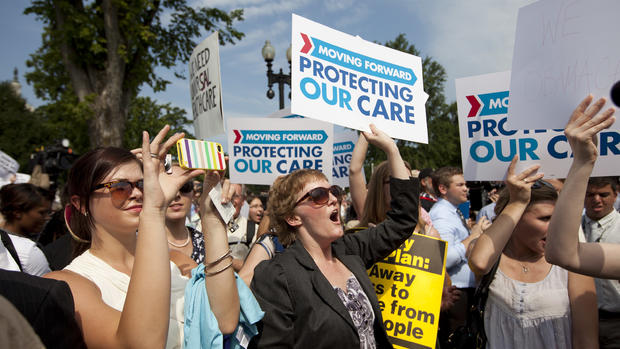Medicaid expansion could help millions -- but not all states want in
(CBS News) In Thursday's ruling on healthcare, the Supreme Court said that states cannot be forced to expand their Medicaid programs. That expansion would have covered 17 million more of the working poor in this country. So what happens now?
Complete Coverage: Health Care
Supreme Court upholds health care mandate
Read the Supreme Court's full decision
Nikki Sweet has been a music producer in Hollywood for 25 years. But when she lost her full-time job in 2008, she also lost her health insurance.
"It felt like swimming in the middle of the ocean," she said. "I didn't know what to do."
The Medicaid expansion was designed for people like Nikki who cannot afford private insurance. Medicaid would grow to include those making 33 percent above the poverty line. The maximum income to qualify would go from $23,050 per year for a family of four to nearly $31,000.
Supreme Court health care ruling: Where states stand
"It's not just people that are on welfare and below the poverty level," Sweet said. "There is a group of people now that can't afford health care of any kind."
The court ruled that each state gets to decide if they want to expand their Medicaid rolls. States argued the expansion of the program would have placed an undue burden on the states, and the court agreed, writing in its opinion that the provision was like a "gun to the head of the states."
Twenty-six states oppose the expansion even though the federal government would pay all the costs for the first three years. States start contributing in 2017. For Texas, that would mean paying $4.5 billion over five years.
Read more about Medicaid expansion at Kaiser Family Foundation
""We can make the best decision for the health care needs of our state without the bureaucrats in Washington DC telling us how to spend our money,' said Texas Attorney General Greg Abbott.
So Medicaid may not be an option for Ismael Medellin, who lives near Dallas. He had a heart attack in February, is uninsured and is struggling to pay $160 per month for medication.
"There are a lot of us who want to work. We want the insurance, but we can't afford it," Medellin said. "Work something out with us so that we can afford it."
Seven states and the District of Columbia are already offering expanded coverage -- using state funds until the federal government starts paying in 2014.
Nikki Sweet comes to the Venice Family Clinic for blood work to treat her thyroid disease. She'll now be eligible for Medicaid, because California plans to go along with expansion.
"What it means for me now is I have some peace of mind," she said.
So what happens to the person who won't get the expanded Medicaid coverage in their state but also cannot afford private insurance?
They could be eligible for subsidies to help them buy insurance. If they don't buy, they would be forced to pay a penalty for being uninsured beginning in 2014.


